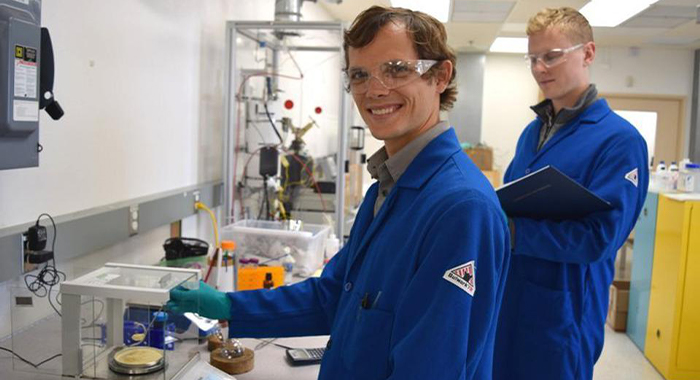A Taste of Life in the Lab
Ian Klein ’10 is getting closer to launching the chemicals-from-plants solution that has filled his waking hours for at least a decade. Spero Renewables, a technology development company based in Santa Barbara, Calif., hopes to be able to offer a manufacturing process for license within two years which will initially be used to make vanilla from corn, but which has many potential applications.
“I’ve been focused non-stop on this path of replacing petroleum-based projects since I left St. Norbert, we’ve been working toward a commercial process for 10 years and it’s only now it seems we’re getting close,” says Klein, who made Forbes’ 30 Under 30 list in 2014, just before completing graduate school at Purdue University.
That was where the Spero team came together (the founder Madhi Abu-Omar was Klein’s adviser) while working on a U.S. Department of Energy research project on biofuels.
“While biofuels are important, we were fired up by being able to create new chemical stock from plants that can replace all kinds of products coming from petroleum. The vanilla is just the first demonstration of the technology which allows us to get to market as quickly as we can. We’re applying related technologies to make plant-based plastics; that’s a much larger, more complex project.”
The project was covered by Forbes in its article The World Is Facing A Natural Vanilla Shortage. This Guy Says He Will Fix That By Producing Vanilla From Corn Fiber.
Five factors for science success
Interested in a career in science? We asked Klein for his top five tips for those setting out on this journey. Here’s Klein:
- Get research experience early and often, because research is where you apply what you learn in the classroom and really become a scientist. At St. Norbert I worked on research projects early and that helped me accelerate my career.
- Consider grad school. Most scientists can get paid to go to grad school; you’ll get the experience you need to design and direct research, and it’s fun. After SNC you’ll be ready for it and beyond.
- Be ready to collaborate. You need to work across disciplines to give you the tools to solve the big problems that we need to solve. We’re getting better at that in science. At Purdue, I worked on a project on biofuels sponsored by the U.S. Department of Energy which was early experience in working across disciplines.
- Do something you love, that’s exciting for you. Keep doing it and become a world expert in it. I’ve always been interested in making things and developing new processes, and I saw a lot of opportunity in chemistry.
- Be confident. Take advantage of your time at SNC and you’ll be equipped to compete with any graduate from any university in the world. Your life in the lab is just part of it. Having a liberal arts background will help you to collaborate and look at problems differently.
May 13, 2021












